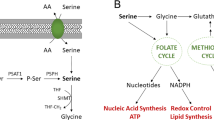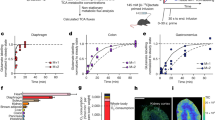Abstract
The deuterated benzaldehyde derivative zilascorb(2H), 5,6-O-benzylidene-d-L-ascorbic acid, was administered once daily by i.v. injection in nude mice with grafted tumours of a human malignant melanoma (E.E.) and ovarian carcinoma (OVCAR-3) origins. Like benzaldehyde, zilascorb(2H) has been shown to induce protein synthesis inhibition at otherwise non-toxic doses in cells grown in vitro, and acts reversibly in the sense that protein synthesis returns to normal shortly after removal of the drug. The present data indicate that daily injections with zilascorb(2H) induce a tumour volume growth inhibitory effect in both tumour xenografts studied. Furthermore, from histological examinations of each single tumour it was found that tumours of drug-treated animals, although smaller than those of placebo-treated (i.e. control) animals, had, on average, a higher necrotic fraction than control tumours. Thus, it is concluded that zilascorb(2H) induces tumour necrotisation and not just inhibition of the rate of tumour cell production. Continued measurement of tumour volume after ended treatment with zilascorb(2H) indicated that surviving tumour cells resumed their normal growth rate immediately. The reversibility of the effect induced by this compound, earlier observed in vitro only, is therefore here confirmed to be valid also in two different tumour xenografts in vivo. The present data accords well with the assumption that protein synthesis inhibition is the primary cellular effect of zilascorb(2H) in vivo. We therefore conclude that zilascorb(2H)-induced cancer cell lethality in tumour xenografts probably comes as a secondary consequence of prolonged protein synthesis inhibition.
This is a preview of subscription content, access via your institution
Access options
Subscribe to this journal
Receive 24 print issues and online access
$259.00 per year
only $10.79 per issue
Buy this article
- Purchase on Springer Link
- Instant access to full article PDF
Prices may be subject to local taxes which are calculated during checkout
Similar content being viewed by others
Author information
Authors and Affiliations
Rights and permissions
About this article
Cite this article
Pettersen, E., Larsen, R., Dornish, J. et al. Tumour necrotisation in nude mice xenografts by the reversible protein synthesis inhibitor zilascorb(2H). Br J Cancer 67, 650–656 (1993). https://doi.org/10.1038/bjc.1993.121
Issue Date:
DOI: https://doi.org/10.1038/bjc.1993.121
This article is cited by
-
The bioavailability and dose dependency of the deuterated anti-tumour agent 4,6-benzylidene-d 1-d-glucose in mice and rats
Cancer Chemotherapy and Pharmacology (1995)



